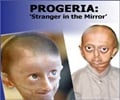Researchers have identified a fusion protein that may contribute to Cockayne syndrome (CS), characterized by developmental defects, neurodegeneration, severe wasting, and premature aging.
Researchers at the University of Washington have identified a fusion protein that may contribute to Cockayne syndrome (CS), a devastating disease characterized by developmental defects, neurodegeneration, severe wasting, and premature aging.
Scientists already know that genetic defects in certain DNA repair factors like the CSB protein cause premature aging, but the reasons are still not clear.In most cases, recessive mutations in the CSB gene leads to premature aging syndrome, yet some people with inherited mutations that cause complete loss of the CSB protein are nearly unaffected.
Therefore, the implication is that the loss of functional CSB protein is not solely responsible for CS, but it is also caused by continued expression of CSB-related proteins or protein fragments.
The research team, led by Alan Weiner, had been studying the normal function of the CSB gene when co-author John Newman stumbled across hints that the human CSB gene harboured a previously unsuspected guest.
The previously unsuspected guest was a ‘domesticated’ PiggyBac transposon – a formerly selfish ‘jumping gene’ that had settled into the CSB gene over 40 million years ago before marmosets diverged from humans.
As a result, the CSB gene started making two equally abundant products – the normal CSB protein, and a fusion protein in which the beginning of the CSB protein was fused to the DNA transposase encoded by the PiggyBac element.
Advertisement
The researchers said that the conserved fusion protein is clearly advantageous for the human species in the presence of the CSB protein, but potentially devastating for individuals in the absence of the CSB protein.
Advertisement
The study is published in the open-access journal PLoS Genetics.
Source-ANI
SRM/L









